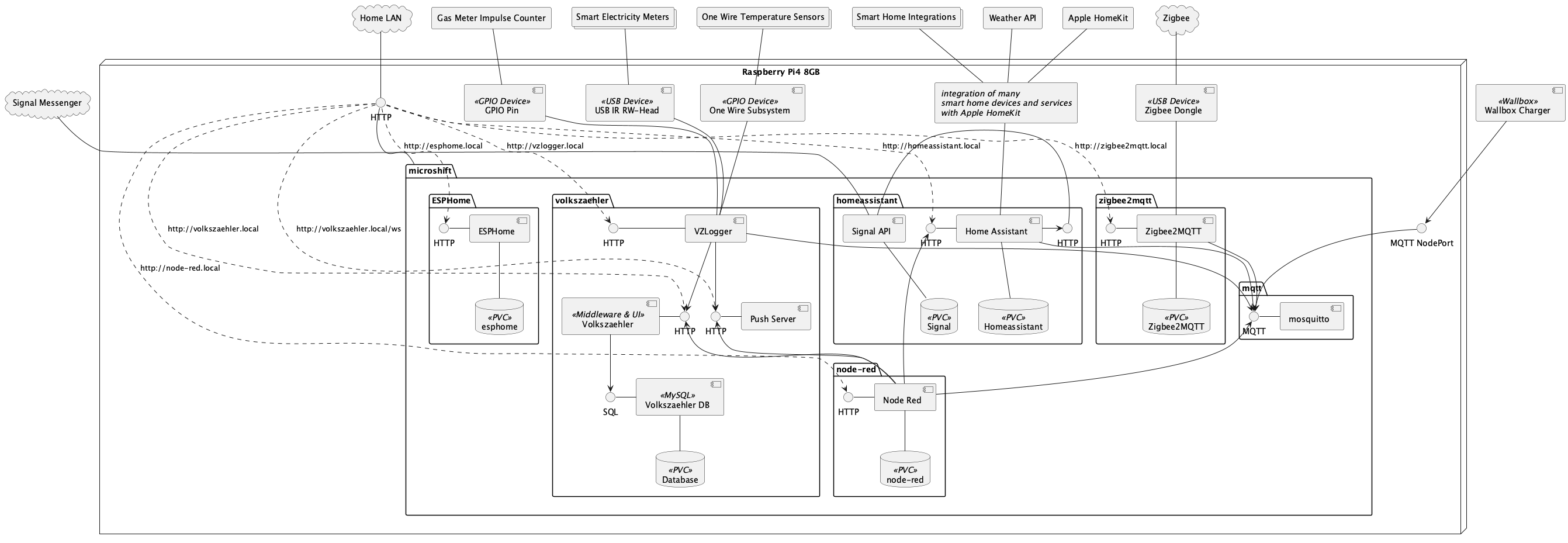Based on Fedora IoT / Fedora 36 and containerized MicroShift based on OpenShift 4.8. Given that MicroShift is undergoing rapid development, the notes are already outdated at the time of publishing.
[root@p200300cfaf07d500c73722aece5bd6e0 ~]# parted
GNU Parted 3.4
Using /dev/mmcblk0
Welcome to GNU Parted! Type 'help' to view a list of commands.
(parted) p
Model: SD SN64G (sd/mmc)
Disk /dev/mmcblk0: 63.9GB
Sector size (logical/physical): 512B/512B
Partition Table: msdos
Disk Flags:
Number Start End Size Type File system Flags
1 1049kB 526MB 525MB primary fat16 boot
2 526MB 1600MB 1074MB primary ext4
3 1600MB 4294MB 2694MB primary ext4
(parted) resizepart 3
Warning: Partition /dev/mmcblk0p3 is being used. Are you sure you want to continue?
Yes/No? Yes
End? [4294MB]? 63.9GB
(parted) p
Model: SD SN64G (sd/mmc)
Disk /dev/mmcblk0: 63.9GB
Sector size (logical/physical): 512B/512B
Partition Table: msdos
Disk Flags:
Number Start End Size Type File system Flags
1 1049kB 526MB 525MB primary fat16 boot
2 526MB 1600MB 1074MB primary ext4
3 1600MB 63.9GB 62.3GB primary ext4
(parted) quit
[root@p200300cfaf07d500c73722aece5bd6e0 ~]# resize2fs /dev/mmcblk0p3
resize2fs 1.46.3 (27-Jul-2021)
Filesystem at /dev/mmcblk0p3 is mounted on /sysroot; on-line resizing required
old_desc_blocks = 1, new_desc_blocks = 8
The filesystem on /dev/mmcblk0p3 is now 15201280 (4k) blocks long.timedatectl set-timezone Europe/Berlin
#microshift.local required for mDNS
hostnamectl set-hostname microshift.local
echo "127.0.0.1 microshift microshift.local" >> /etc/hostsSo that containers get the upstream DNS configured, flannel conflicts with systemd-resolved
sed -i 's/^.\?DNSStubListener=.*$/DNSStubListener=no/' /etc/systemd/resolved.confcurl -L -o /etc/yum.repos.d/fedora-modular.repo https://src.fedoraproject.org/rpms/fedora-repos/raw/rawhide/f/fedora-modular.repo
curl -L -o /etc/yum.repos.d/fedora-updates-modular.repo https://src.fedoraproject.org/rpms/fedora-repos/raw/rawhide/f/fedora-updates-modular.repo
curl -L -o /etc/yum.repos.d/group_redhat-et-microshift-fedora-36.repo https://copr.fedorainfracloud.org/coprs/g/redhat-et/microshift/repo/fedora-36/group_redhat-et-microshift-fedora-36.repo
rpm-ostree update
rpm-ostree ex module enable cri-o:1.21
rpm-ostree install cri-o cri-tools git nss-mdns avahi
systemctl reboot
systemctl enable --now avahi-daemon.service
Configure Microshift (disabled since the defaults work well & .local as domain can be used for mDNS)
mkdir /etc/microshift/
cat - > /etc/microshift/config.yaml <<EOF
cluster:
domain: microshift.fritz.box
EOF
mv /etc/microshift/config.yaml /etc/microshift/config-disabled.yamlsee also https://microshift.io/docs/user-documentation/networking/firewall/
firewall-cmd --zone=trusted --add-source=10.42.0.0/16 --permanent
firewall-cmd --zone=public --add-port=80/tcp --permanent
firewall-cmd --zone=public --add-port=443/tcp --permanent
firewall-cmd --zone=public --add-port=5353/udp --permanent
firewall-cmd --zone=public --add-port=6443/tcp --permanent
firewall-cmd --reloadcurl -o /etc/systemd/system/microshift.service \
https://raw.githubusercontent.com/redhat-et/microshift/main/packaging/systemd/microshift-containerized.service
systemctl enable microshift --nowmkdir ~/.kube
sudo podman cp microshift:/var/lib/microshift/resources/kubeadmin/kubeconfig ~/.kube/config
sudo chown `whoami`: ~/.kube/configrpm-ostree install microshift
systemctl reboot
[...]
systemctl enable microshift --nowmkdir ~/.kube
sudo cat /var/lib/microshift/resources/kubeadmin/kubeconfig > ~/.kube/configcurl -# -L -o /tmp/openshift-client-linux.tar.gz https://mirror.openshift.com/pub/openshift-v4/aarch64/clients/ocp/stable-4.10/openshift-client-linux.tar.gz \
&& tar xzvf /tmp/openshift-client-linux.tar.gz -C /usr/local/bin/ oc kubectl \
&& chmod +x /usr/local/bin/oc /usr/local/bin/kubectl \
&& rm /tmp/openshift-client-linux.tar.gzecho -n "dtoverlay=w1-gpio,gpiopin=4" >>/boot/efi/config.txt
rpm-ostree install kernel-modules-extra #give access to w1_therm
systemctl rebootchmod a+rw /dev/gpiochip0Enable Ingress Traffic on Node Ports 30010-30030. This range has been chosen since it is also in the NodePort range:
firewall-cmd --zone=public --add-port=30010-30030/tcp --permanent
firewall-cmd --reloadHomebridge runs on the host network. You need to configure homebridge to use the ports which have been exposed.
{
"bridge": {
"name": "Homebridge",
"username": "59:73:93:78:B4:DA",
"port": 30010,
"pin": "998-42-561",
"advertiser": "avahi"
},
"ports": {
"start": 30012,
"end": 30019
},
"description": "Home Smart Home",
"platforms": [
{
"platform": "config",
"name": "Config",
"port": 8581,
"auth": "form",
"theme": "red"
},
{
"name": "Sonos",
"brightness": true,
"excludeAirPlay": false,
"nameScheme": "% Lärm",
"address": "192.168.10.54",
"port": 30011,
"service": "switch",
"speakers": true,
"tv": true,
"platform": "ZP"
},# firewall-cmd --add-port=1400/tcp --permanent
# firewall-cmd --reload
# firewall-cmd --add-port=21064-21080/tcp --permanent
# firewall-cmd --reload
